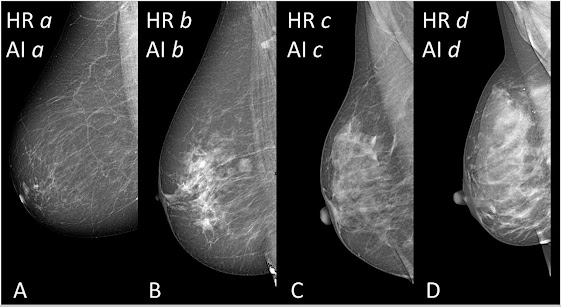NEWS FROM THE FIELD
The DENSE BREAST TISSUE / CANCER CONNECTION is a topic that has finally achieved proper recognition in our community. Thanks to organizations like The 'ARE YOU DENSE?' Foundation, awareness of this health concern has now shed light to the risk to 40+% of the national women's population whereby more clinicians are now recognizing the need to state a patient's dense breast status. Research crusaders like Dr. Noelle Cutter and research associate Alexandra Fiederlein from Molloy University are underway the 2022 National Survey of Dense Breast Studies by bringing ultrasound access to underserved members of the women's community. In a recent episode of SPOTLIGHT ON AMERICA, Dr. Bard spoke as the clinical expert in the report "Millions of women have this breast cancer risk factors... why aren't they being informed?" -- TND REPORT/Spotlight on America is pressing to ensure women have access to a crucial health fact that could save their lives. According to the Centers for Disease Control and Prevention, 40% of women have dense breast tissue, which is a risk factor for cancer. The TND team first highlighted this issue in October 2021, and more than a year later, we expose how some women are still being left in the dark about their density, and federal health bodies are failing to make sure they’re informed. |
A major concern is the presence of breast cancer in underserved communities, including those TOO YOUNG FOR A MAMMOGRAM. Whereby the medical community touts the recommended (and legal/billable status) of getting a mammo scan should be between 40-50, what happens to the many women who do not fit this age criteria? How would they even know to get checked without the support of their clinicians or an alarm from family history?
According to Breastcancer.org, "Where mammography is available, ultrasound should be seen as a supplemental test for women with dense breasts who do not meet high-risk criteria for screening [with] MRI and for high-risk women with dense breasts who are unable to tolerate MRI... but if mammography isn’t available, then ultrasound seems to be a good alternative for breast cancer screening."
 |
| Doppler Sonography offers clinical accuracy and access to breast imaging evaluation (www.breastcancernyc.com) |
Mammography is the current standard for breast cancer early detection for women 40 & older. Recent studies have shown nearly half of all women who get mammograms are found to have dense breasts, exposing this population to the risk that mammograms may miss potentially cancerous tumors concealed by dense breast tissue. Dr. Cutter's initial concepts to target LOW BMI (bet 12-22% body fat) was personally inspired. As an active TRIATHLETE, her own diagnosis sparked her survey and inquiry throughout the athletic community where she uncovered a significant trend that became the basis for this research. She wishes to target younger women, athletes and members of underserved communities. "Younger women may be more likely to have dense breasts... also I find athletes with LOWER BMI (body mass index) or those with less body fat are more likely to have more dense breast tissue compared with women who are obese." (See complete feature article)
PERSPECTIVE: PERSONAL FINDINGS BY A CLINICAL PROFESSIONAL
 |
| See 2022 Dense Breast Ultrasound Study |
Feature: Diagnostic Tech Review/News:
TRACE4BDENSITY® − THE RADIOLOGISTS’ GUIDED ARTIFICIAL INTELLIGENCE TOOL FOR THE AUTOMATIC DENSITY CLASSIFICATION OF MAMMOGRAMS
DeepTrace Technologies SRL (http://www.deeptracetech.com/), the multi-awarded university spinoff of the IUSS School of Pavia, Italy, developed an AI software for automatic breast density classification using a deep learning approach, i.e., supervised convolutional neural networks: TRACE4BDensity®. The system was trained using the majority breast density category determined by seven board-certified radiologists who independently visually assessed 760 mediolateral oblique images. The model showed an accuracy of 89.3% in distinguishing BI-RADS a or b (nondense breasts) versus c or d (dense breasts) categories, with an agreement of 90.4% and a reliability of 0.807 (Cohen κ) compared with human readers. The clinical study that used TRACE4BDensity has been published in Radiology Artificial Intelligence 2022[1] and recently presented at the European Congress of Radiology in Vienna on July 16, 2022.
From A to D: examples of human readers (HR)–artificial intelligence (AI) agreement. TRACE4BDensity showed a 89.3% agreement and a reliability of 0.807 (Cohen κ) with human readings for the differention of dense breasts (category c or d) versus nondense breasts (category a or b). Radiol Artif Intell 2022 (doi/10.1148/ryai.210199).
The software can be directly applied to the PACS of radiology centers providing the breast density category in a few seconds with 100% reproducibility, allowing breast radiologists to overcome the limitations of human reading that unfortunately may give different answers to the crucial question: Are you dense? In addition, this approach can be considered more fitting with the aim of avoiding delayed cancer diagnoses than methods purely based on quantitative assessment of fibroglandular and fatty breast tissue that may underestimate the masking effect of localized high- density areas. Such an accurate tool, proposing a standardized density classification, represents a valid help in the decision-making process and in proposing a more personalized breast cancer screening. «TRACE4BDensity can help us to provide advice to women with dense breasts about the possibility of having, after a negative mammogram, additional screening with ultrasound, MRI, or contrast-enhanced mammography − explains Professor Francesco Sardanelli, head of the Diagnostic Imaging Service at the IRCCS Policlinico San Donato, coordinator of the Gruppo San Donato Breast Imaging Joint Research Unit, and full professor at the University of Milan, principal investigator of the study − This software, therefore, proves useful for radiologists as well as for women and patients».
References:
1) Development and Validation of an AI-driven Mammographic Breast Density Classification Tool Based on Radiologist Consensus, https://pubs.rsna.org/doi/10.1148/ryai.210199
CONTRIBUTORS:
DR. ROBERT L. BARD has paved the way for the diagnostic study of various cancers both clinically and academically. He runs an active NYC practice (Bard Diagnostic Imaging) using the latest in digital Imaging technology which has been also used to help guide biopsies and, even replicate much of the same reports of a clinical invasive biopsy. Imaging solutions such as high-powered Sonograms, Spectral Doppler, sonofluoroscopy, 3D/4D Image Reconstruction and the Spectral Doppler are safe, noninvasive, and does not use ionizing radiation. His commitment to lead the community of cancer imaging and diagnostic experts has led to the establishment of the "Get Checked Now!" campaign.
JOSEPH J. CAPPELLO married Nancy Marcucci, in 1974 and the story began. Joe is the co-founder and executive director of Are You Dense, and Are You Dense Advocacy- in January of 2019 after Nancy’s passing from treatment related bone marrow cancer (MDS). His passion is to continue Nancy’s legacy by pursuing the goal that they set in 2004; that not one woman would die from a late stage breast cancer due to dense breast tissue. In 2009, Joe and Nancy championed the first in the nation breast density inform law in the State of Connecticut (and now, 36 States have breast density legislation).
ROBERTA KLINE, MD (Educational Dir. /Women's Diagnostic Group) is a board-certified ObGyn physician, Integrative Personalized Medicine expert, consultant, author, and educator whose mission is to change how we approach health and deliver healthcare. She helped to create the Integrative & Functional Medicine program for a family practice residency, has consulted with Sodexo to implement the first personalized nutrition menu for healthcare facilities, and serves as Education Director for several organizations including the Women’s Diagnostic Health Network, Mommies on a Mission.
Copyright Notice: The materials provided on this website/web-based article are copyrighted and the intellectual property of the publishers/producers (The NY Cancer Resource Alliance/IntermediaWorx inc. and The AngioFoundation). It is provided publicly strictly for informational purposes within non-commercial use and not for purposes of resale, distribution, public display or performance. Unless otherwise indicated on this web based page, sharing, re-posting, re-publishing of this work is strictly prohibited without due permission from the publishers. Also, certain content may be licensed from third-parties. The licenses for some of this Content may contain additional terms. When such Content licenses contain additional terms, we will make these terms available to you on those pages (which his incorporated herein by reference).The publishers/producers of this site and its contents such as videos, graphics, text, and other materials published are not intended to be a substitute for professional medical advice, diagnosis, or treatment. For any questions you may have regarding a medical condition, please always seek the advice of your physician or a qualified health provider. Do not postpone or disregard any professional medical advice over something you may have seen or read on this website. If you think you may have a medical emergency, call your doctor or 9-1-1 immediately. This website does not support, endorse or recommend any specific products, tests, physicians, procedures, treatment opinions or other information that may be mentioned on this site. Referencing any content or information seen or published in this website or shared by other visitors of this website is solely at your own risk. The publishers/producers of this Internet web site reserves the right, at its sole discretion, to modify, disable access to, or discontinue, temporarily or permanently, all or any part of this Internet web site or any information contained thereon without liability or notice to you.






.jpg)


.jpg)








No comments:
Post a Comment